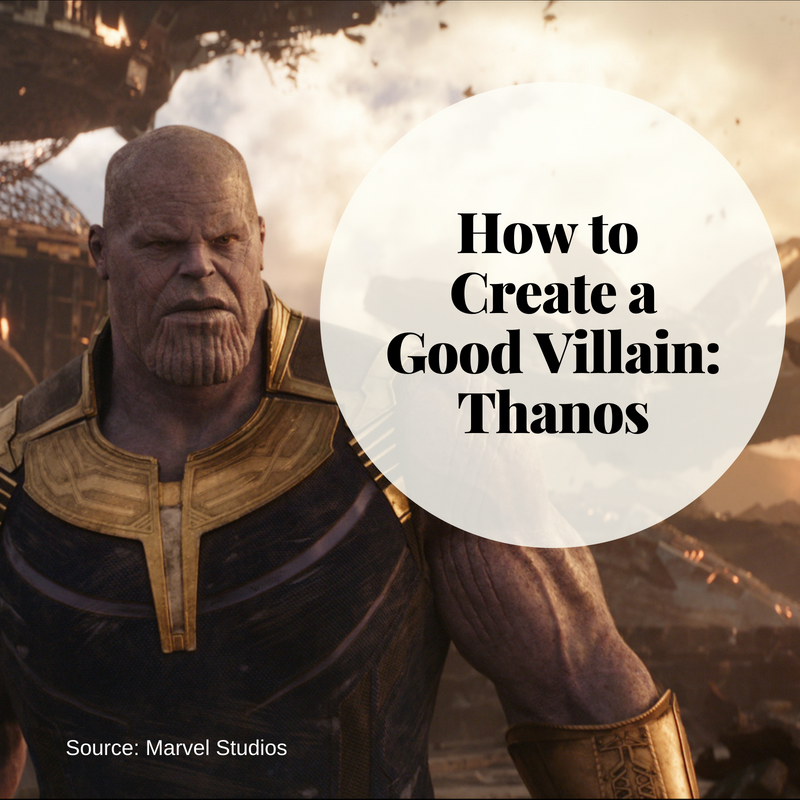How to Create a Good Villain: Thanos
Last updated on November 23rd, 2022 at 07:28 am
Spoilers ahead! You have been warned.
I was beyond excited for Avengers: Infinity War, and it is amazing. Part of what makes Infinity War so good is its villain, Thanos. This entire movie is built around Thanos. The ending even says “Thanos will return” which is chilling and unsettling to viewers. So, let’s talk about Thanos and what makes him a good villain. Let’s break it down so you can use Thanos to create a good villain yourself.
He’s sympathetic
Part of what makes Thanos a good villain is that we are meant to sympathize with him. A big chunk of this sympathy comes from his relationship with Gamora. It humanizes him. We see him take her aside as a small child and protect her from violence, admittedly violence he causes. When he kills Gamora to reach his goals, he’s crying, and the viewers realize he is capable of love. It feels like a tragedy (more on this later). Furthermore, when Gamora thinks she has killed him, she breaks down sobbing which tells the viewers that there is something redeemable about him since he’s worth crying over.
His motivations are understandable, and he’s a little bit right
He is the hero of his story. He wants to bring balance to the universe so no one has to suffer anymore. He sees the destruction of his planet as a failure to do what was necessary. When he talks about how Gamora’s planet is better off now and how children are well-fed, it makes arguing with him more difficult. Ultimately, he’s a villain that’s trying to help. It’s not that he’s intrinsically violent, and he just wants to kill everyone because its fun. He’s trying to save everyone or…half of everyone. This is definitely an aspect to consider when you create a villain.
He wins
This was a bold move on Marvel’s part, and it totally paid off. It’s connected to another idea which is Thanos is actually dangerous. He can actually achieve his goals. He fights all of the heroes we have come to know and love, and he wins. It still blows my mind. But considering the build-up Marvel gives Thanos and everything viewers see, it makes sense.
Thanos is a good villain because viewers support him just a little. They can get behind his goals even if they can’t get behind his methods. We understand why he has an entourage that truly believes in his cause. He sees himself as a hero who gets to look upon a “grateful” universe. Plus, your villains have to win once in a while. If your villains always lose, you lose the stakes, and your story becomes stale.
Compare all this with Steppenwolf from Justice League. His motivations are only to wage war and destroy the planet. This makes him both decidedly unsympathetic and ridiculous. Obviously, the entire world is not going to be destroyed. The stakes are too high. Plus, he’s not given any depth (beyond perhaps some mommy issues), and the heroes defeat him relatively easily. He’s a rushed, one-dimensional villain.
The Problem
We have to talk about Gamora. I loved Infinity War, but Gamora’s death is the reason I left feeling disappointed.
Gail Simone, the writer of Wonder Woman and Deadpool among others, has this website called Women in Refrigerators. The homepage says, “This is a list I made when it occurred to me that it’s not that healthy to be a female character in comics…These are superheroines who have been either depowered, raped, or cut up and stuck in the refrigerator…Some have been revived, even improved — although the question remains as to why they were thrown in the wood chipper in the first place.”
It’s basically come shorthand for when a woman character is murdered or injured for the sake of upsetting someone else. It can also be used as shorthand for when a woman character is harmed for the character development of a man. Sound familiar?
Gamora’s death is both shocking and heartbreaking. But we are not meant to empathize with her. The cinematography and the narrative tell us that we should empathize with Thanos. Mantis goes on and on about how much he’s suffering. We get close-up shots of him crying. This isn’t a surprise. This movie is all about Thanos and his journey. The problem with this is that it calls on a long history of women suffering to make us feel bad for men. Gamora’s death is a crucial element to Thanos being sympathetic, but it’s not fair to Gamora. And this is in a movie that is already fundamentally unfair to women. It doesn’t help that we also have to linger on Peter Quill’s pain rather than, say, Nebula’s. Anyway. I’m getting off track now.
Unfortunately, when you create a villain, you can’t just think about what would simply make a good story. You have to think about history and how your villain fits in it. This goes for death too, by the way.
Overall, Thanos’s villainy is a cinematic achievement. His character is the result of a lot of hard work on Marvel’s part. He’s scary before he even steps into the frame because we already know so much about him. Thanos is the hero of his story, and the directors make sure we know that.
Update 9/5/2019: I’ve thought about this post frequently since I’ve published it. I don’t necessarily disagree with it now, but I no longer believe that Thanos is the best display of the above qualities, particularly in the Marvel Universe. If you haven’t, watch Black Panther. It’s a better example of what I’ve talked about in this post. The villain in that movie manages to be both more right and more sympathetic. Watch it. You won’t regret it. It’ll give you an even better idea of how to create a villain.


2 Comments